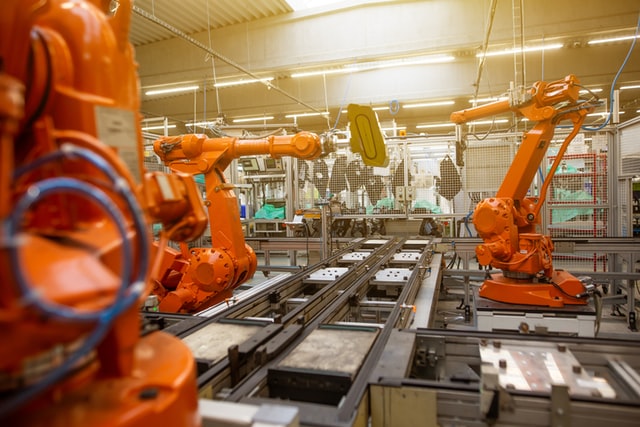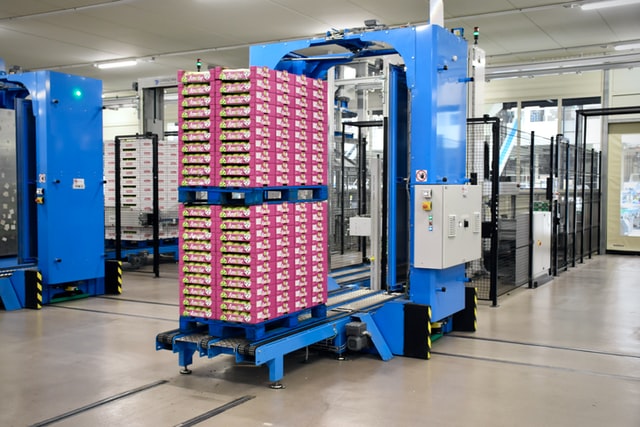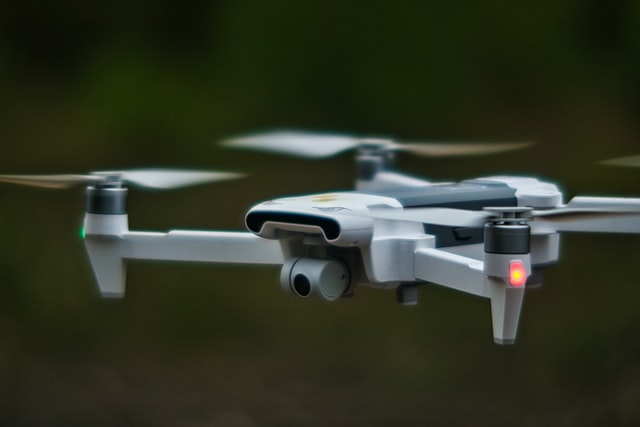Remember the history classes, when they talked about industrial revolution, the period of technological development that revolutionized the way of working in industries?
It happened in the 18th century and since then it is always constantly evolving.
Called the Fourth Industrial Revolution, Industry 4.0 brings with it new technologies and forms of work that accompany the progress of the world.
It is part of the development of the economy and the excellence of work understand and be familiar with all types of connectivity and, for this, you can count on a team specialized in certifications that optimizes and facilitates your activities.
Access our material on Anatel Certification and know the set of technical procedures that ensures a quality standard in telecommunications devices in the country. Know the services offered and always be ahead!
Industry 4.0 in Brazil: what is it?
Industry 4.0 in Brazil is the country's representation of the industrial sector contingent that uses automation resources in its activities such as robotics, artificial intelligence, cloud computing and the Internet of Things.
By digitizing industrial activities it is possible to optimize processes and increase productivity.
What is the importance of Industry 4.0 for Brazil?
The advancement of the digitization of industries has a direct impact on the economy. It is estimated that by implementing technologies related to the Internet of Things, Brazil can generate profits of more than US$ 210 billion by 2030.
Creating conditions for improvement in work environments, infrastructure, investing in technological dissemination programs, it brazil to another economic level and reduce costs of equipment maintenance and energy consumption, while increasing work efficiency.
Top Five Technologies in Industry 4.0
Internet of things
It is called the Internet of Things the interconnection between objects by enabling infrastructure (software, sensors, electronics), distributing and organizing computing on networks that communicate and interact with each other.
Artificial intelligence
Set of advanced techniques based on logic that analyzes trends, interprets events and behaviors of systems and performs actions.
Cloud computing
It is the internet distribution of compute services, using storage capacity and memory utilization hosted in Datacenter.
It is the possibility to access computational resources on various devices.
This enables a smaller investment in support equipment and gives a greater margin for the company to invest in its activities.
Cyber security
Structured hardware and software for the protection of information that is stored and transported by the interconnection of systems.
Big data
The information, trends and inferences that are not possible to be analyzed in a human way are part of big data, the performance in data with greater complexity and variety, helping to solve business issues.
Statistical and machine learning techniques are used to collect important information for the job.
Industry 4.0 in Brazil: Examples

By now, you may have understood that the 4th Industrial Revolution promises to increase the productivity, efficiency and profitability of organizations, through technologies and data management.
However, how can this concept be applied in practice? How are countless companies using these digital innovations to revolutionize their processes? Check out some examples below:
- cycle time monitoring: electronic engineering multinationals already use software to connect machinery to industry systems. Thus, you can track the production status in real time;
- Manufacturing linked to Industry 4.0: Honing technology companies are using cloud systems to track their productions in real time in order to optimize manufacturing. With this, the efficiency of production is improved;
- IoT for predictive maintenance: suppliers of industrial robotic machines have been using IoT to update operating protocols and perform predictive maintenance to reduce production losses;
- AR for training and operations: Automation market organizations have begun using Augmented Reality to teach new processes to workers more efficiently. Thus, it is possible to simplify instructions and complex processes, speeding up the training of the team;
- product quality inspection: hydraulic valve producers have adapted their IoT machines to transform a manual inspection process, speeding up manufacturing time and saving resources.
When did Industry 4.0 come about in Brazil?
The concept of Industry 4.0 emerged in mid-2010 in Germany, promoting the computerization of manufacturing.
The term was brought to Brazil only in 2013, when industries began to look with other eyes at the digitization of their activities.
How is Brazil and Industry 4.0 today?
Industry 4.0 in Brazil 2021 is still in development, today being more of a concept than an applied reality, since there are still few industries that have advanced technology resources in their services.
There is intense work and investment in research to develop new technologies already used in Germany and Italy, Brazil.
We are developing in the country the necessary progress in the capacity of computers, designing strategies of evolution and learning to deal with large contingents of digitized information.
Industry Benefits 4.0 for Brazil
In addition to the aforementioned impact on GDP, Industry 4.0 aims at an industrial ecosystem, such as logistics, more efficient, fast, autonomous and customer-centric.
We are talking about the development of intelligent, digitized transport and constructions that facilitate work, increase competitiveness, reduce expenses and errors, assist in making decisions more assertively and increase safety.
The main industry figures 4.0 in Brazil

Despite advances around the globe, the scenario of Industry 4.0 in Brazil evolves slowly.
According to a survey conducted by Fiesp (Federation of Industries of the State of São Paulo), reveals that our country does not stand out both in the main areas of the 4th Industrial Revolution, such as Big Data, IoT and AI (Artificial Intelligence).
This study also showed that only 5% of organizations believe they are "very prepared" to face the obstacles of Industry 4.0. Fiesp researchers point to some causes of this delay in Brazil.
First, there are some bottlenecks in the Brazilian industry. In addition, there is a shortage of professionals technically prepared to work with the new technologies of an automated industrial environment.
According to the CNI (National Confederation of Industry), Brazil is home to approximately 700,000 industries. However, only 1.6% of them joined Industry 4.0.
But even with these discouraging numbers, the country has great potential to successfully implement Industry 4.0.
The agribusiness, beverage, pharmaceutical, automotive and food sectors, for example, are home to high investments in technological innovations and processes.
For ABDI (Brazilian Agency for Industrial Development), this can result in a reduction of more than R$ 73 billion in industrial costs per year.
Given these data, the Federal Government has already taken the initiative; the Ministry of Industry, Foreign Trade and Services inaugurated GTI 4.0 (Working Group for Industry 4.0) in 2017.
Other measures, such as facilitating access to credit and knowledge dissemination, are already underway to encourage the implementation of Industry 4.0.
What are the difficulties for the advancement of Industry 4.0 in Brazil?
Many wonder what the challenges of Industry 4.0 in Brazil are. There are several factors that interfere with advances, although many industries already use many of the concepts of digital manufacturing.
The main aspects observed are outdated suppliers (your company can know and work with the concepts, but if suppliers do not follow the advance, it is difficult to balance), the need for high investment in technology, the lame infrastructures and the change in culture, in the already known, which can be complex for some.
Industry 4.0 worldwide
With the advancement of technology every day, more developed countries come out ahead in the advances related to Industry 4.0 because they have greater investment capacity in research and development in the area.
The largest factories operating within the concepts of Industry 4.0 are located in Europe (Germany, Italy, Portugal, among others), the United States and China.
Greater political and economic stability and manufacturing structures prepared for the implementation of new technologies enable a more solid progress of the concepts of Industry 4.0.
Impacts of Industry 4.0 on the labour market

Although it is a slow and time-consuming process, industrial processes are irreversibly changing and labor market professionals need to adapt to the new reality that has been built on work method.
Increasingly automated, Industry 4.0 will require a new professional with specific technical and interpersonal skills, such as having good adaptability and being prepared to address issues that may not have been part of your learning curriculum.
For this, the professional will need to understand technical processes and have certifications. At Master, it is possible to have access to certifications and start the process of adapting to the new demands of Industry 4.0 in Brazil.
Access our material on the Anatel Certification, certification that is part of the optimization and professional training on telecommunication resources within the established quality standards. Talk to a Master expert now and be part of the evolution!
Conclusion: Industry 4.0 in Brazil
That was the information we brought about it.
While Industry 4.0 in Brazil is slow and still developing, professionals are gradually preparing to adapt to the new demand, seeking knowledge and certification in advanced technologies.
This is how the country's development and GDP increase can impact the economy globally, leading Brazil to the potential development of its industries and returning to being one of the fastest growing countries in the sector.
